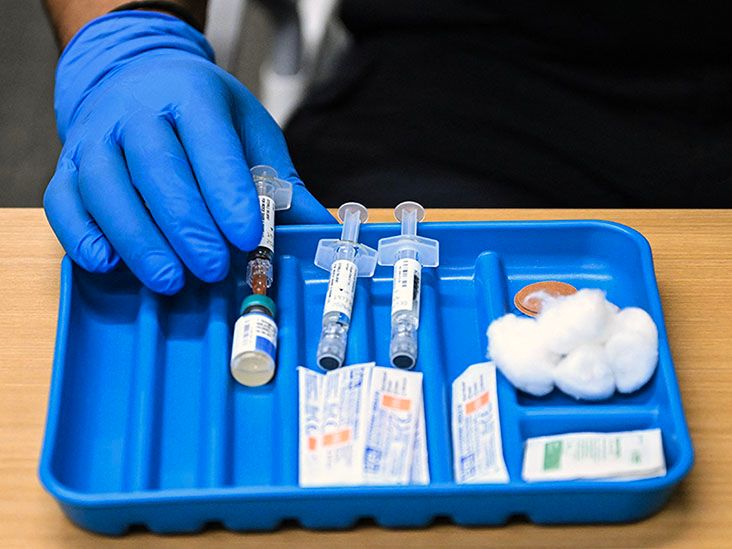Elevidys has no known interactions with alcohol, other drugs, or supplements. This doesn’t mean that interactions aren’t possible or won’t be recognized in the future. Talk with your doctor to avoid potentially harmful effects from Elevidys interactions.
Elevidys is prescribed for Duchenne muscular dystrophy (DMD) in certain adults and children ages 4 years and older. DMD is a genetic (inherited) condition. Elevidys is for children with a confirmed genetic test for DMD.
An interaction occurs when one substance causes another substance to have a different effect than expected.
Elevidys isn’t known to interact with other medications. However, that doesn’t mean interactions aren’t possible. For example, other drugs may be approved in the future that may have interactions with Elevidys.
Before you start treatment with Elevidys, tell your doctor and pharmacist about any prescription, over-the-counter, and other medications you take. By sharing this information with them, you may help prevent possible interactions. (To learn whether Elevidys interacts with supplements, herbs, or vitamins, see the “Elevidys and other interactions” section.)
If you have questions about drug interactions that may affect you, ask your doctor or pharmacist.
In some cases, factors or conditions could prevent your doctor from prescribing Elevidys due to the risk of harm. These are known as contraindications. Below are the contraindications of Elevidys.
Note: Before you start treatment with Elevidys, talk with your doctor about whether these contraindications apply to you. They can determine whether to prescribe Elevidys.
Having certain genetic mutations
Doctors typically will not prescribe Elevidys for people with any deletion in exon 8 and/or exon 9 in the DMD gene. (An exon is a protein-coding region of a gene.) This is because there have been reports of severe, life threatening muscle inflammation in people with these genetic mutations.
People with other DMD gene mutations may also have an increased risk of severe muscle inflammation. However, there isn’t enough information to contraindicate Elevidys treatment in these cases. Call the doctor right away for unexplained muscle pain, muscle weakness, or trouble speaking or swallowing.
Having had an allergic reaction to Elevidys or any of its ingredients
If you’ve had an allergic reaction to Elevidys or any of its ingredients, your doctor will likely not prescribe Elevidys.
Since it’s a one-time treatment, receiving the drug again is not an option, but an allergic reaction during your initial infusion could occur. (Elevidys is given as an intravenous (IV) infusion.) In this case, your doctor may slow down or stop the infusion. You can ask them about other treatments that may be better choices for you.
There are no known interactions between Elevidys and alcohol.
If you have questions about drinking alcohol during treatment with Elevidys, talk with your doctor or pharmacist.
Elevidys isn’t known to have other interactions, such as with supplements, foods, vaccines, or lab tests.
Elevidys interactions with supplements
Although there aren’t any known interactions for Elevidys, it’s still possible for drugs to interact with supplements such as vitamins and herbs.
Elevidys interactions with herbs
There are no specific reports of herbs interacting with Elevidys. However, that doesn’t mean herbal interactions won’t occur or be recognized in the future. Because of this, it’s important to check with your doctor or pharmacist before taking any of these products during Elevidys treatment.
Elevidys interactions with vitamins
There are no specific reports of vitamins interacting with Elevidys. However, that doesn’t mean vitamin interactions won’t occur or be recognized in the future. Because of this, you should talk with your doctor or pharmacist before taking any vitamin product with Elevidys.
Elevidys interactions with food
There were no reports of food interactions with Elevidys. If you’d like to learn more about eating certain foods during treatment with Elevidys, talk with your doctor.
Elevidys interactions with vaccines
There aren’t any known interactions between Elevidys and vaccines. However, treatment with a corticosteroid (such as prednisone) is required with Elevidys. This corticosteroid treatment can interfere with vaccines. For this reason, the doctor will ensure that your vaccinations are up to date and completed at least 4 weeks before starting the corticosteroid.
Talk with your doctor or pharmacist to check whether you’re due for any vaccines.
Elevidys interactions with lab tests
Elevidys isn’t known to interact with lab tests. If you have concerns about this medication interacting with lab tests, talk with your doctor.
ELEVIDYS INTERACTION WITH CANNABIS OR CBDCannabis (often called marijuana) and cannabis products, such as cannabidiol (CBD), have not been specifically reported to interact with Elevidys. However, as with any drug or supplement, talk with your doctor before using cannabis in combination with Elevidys. The impact of cannabis may affect how well you stick to your Elevidys treatment plan.
Note: Cannabis is illegal at a federal level but is legal in many states to varying degrees.
Certain medical conditions and other factors may increase the risk of interactions with Elevidys. Before you receive this treatment, be sure to talk with your doctor about your health history. Elevidys may not be the right treatment option if you have certain medical conditions or other factors affecting your health.
Health conditions or factors that might interact with Elevidys include:
- Certain genetic mutations: Having any deletion in exon 8 and/or exon 9 in the DMD gene increases the risk of serious, life threatening muscle inflammation. See “When to avoid Elevidys” for more details.
- Current infection: Having an infection before or after you receive Elevidys can lead to serious complications. This is due to the required corticosteroid treatment that goes along with Elevidys. Corticosteroids make it harder for your body to fight infections. Call your doctor right away if you have symptoms of an infection, such as fever, cough, or sore throat.
- Liver problems: Elevidys can cause liver injury. People who already have liver disease have an increased risk of developing liver injury with Elevidys. Your doctor will check your liver function before starting Elevidys. They’ll continue checking your liver every week for 3 months after treatment.
- Allergic reaction: If you’ve had an allergic reaction to Elevidys, any of its ingredients, or a similar drug, your doctor will likely not prescribe Elevidys. Receiving the drug could cause another allergic reaction. Talk with your doctor for questions about allergic reactions to Elevidys.
- Pregnancy or breastfeeding: Elevidys treats DMD in certain children ages 4 years and older. The drug is not typically prescribed for people who can become pregnant or breastfeed.
You can take certain steps to help prevent interactions with Elevidys. Your doctor and pharmacist are key resources, so reaching out to them before starting treatment is a helpful first step. For example, it’s important that you plan to do the following:
- Let them know if you drink alcohol or use cannabis.
- Tell them about any other medications you take, as well as any supplements, herbs, and vitamins.
- Create a
medication listTrusted Source , which your doctor and pharmacist can help you fill out.
It’s also important to read the Elevidys label and other
If Elevidys doesn’t come with paperwork, you can ask your pharmacist to print a copy. If you need help reading or understanding this information, ask your doctor or pharmacist.
You can also help prevent interactions with Elevidys by following your doctor’s instructions before, during, and after treatment.
Disclaimer: Medical News Today has made every effort to make certain that all information is factually correct, comprehensive, and up to date. However, this article should not be used as a substitute for the knowledge and expertise of a licensed healthcare professional. You should always consult your doctor or another healthcare professional before taking any medication. The drug information contained herein is subject to change and is not intended to cover all possible uses, directions, precautions, warnings, drug interactions, allergic reactions, or adverse effects. The absence of warnings or other information for a given drug does not indicate that the drug or drug combination is safe, effective, or appropriate for all patients or all specific uses.




